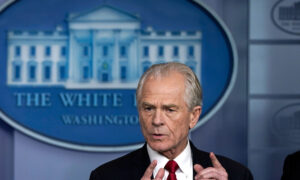Navarro’s Account Explains How to Fight the Chinese Regime
CommentaryPeter Navarro’s exceptional new book, “Taking Back Trump’s America: Why We Lost the White House and How We’ll Win It Back,” is a major contribution to understanding what went right during the Trump administration—and what went wrong. The work is an essential read for anyone who seeks to understand the essence of Trumpism, the “Make America Great Again” movement, populist economic nationalism, and the failures that led to Donald Trump’s defeat in 2020. The book is also valuable due to its clear explication of the threat posed by the Chinese regime and how the Trump administration—the first administration to understand the threat from the regime—labored to counter it. In this regard, Navarro’s rightful focus is on the mistakes made by the administration in its efforts to fight China. The book’s deep contribution is Navarro’s argument that most of the errors made by Trump resulted from bad personnel choices. Navarro is frank: bad personnel choices make bad policy, which makes bad politics. The work is not shy concerning who the bad personnel choices were and the mistakes that were made. Navarro points out five “strategic failures.” First, and most significantly, was to make China the most important issue of the 2020 campaign. Second, Trump’s failure to govern as a populist economic nationalist and run on this in 2020, which would have likely allowed him to win once again Michigan, Pennsylvania, and Wisconsin. Third, the failure of the Trump campaign itself, which was, in his assessment, the most mismanaged in modern history. Fourth, the incompetence of two key advisers—Treasury Secretary Steve Mnuchin and White House chief of staff Mark Meadows—to bring the phase four stimulus and relief bill, which would have provided payments to tens of millions of Americans before election day. Finally, the inability of the White House communications team to fight back against the Never Trump and Orange Man Bad media. The great value of the work regarding the threat from China is that the administration was hamstrung in the fight against the Chinese regime, often by its own members. Senior adviser Jared Kushner, Secretary Mnuchin, and National Economic Policy Director Gary Cohn sought to sustain a globalist agenda that would, in essence, sustain the status quo on China, permitting trade and access to capital markets and so foster China’s growth as had occurred under each president since Bill Clinton. Time and again, Navarro recounts how Kushner, Mnuchin, Meadows, and others were able to negate or weaken Navarro’s efforts to hold the Chinese regime accountable over many issues. This included the Muslim genocide in Xinjiang and other human rights abuses. In one example of many, Navarro discusses how his administration opponents attempted to limit the Department of Homeland Security’s U.S. Customs and Border Protection Work Release Orders (WROs) on products made by forced labor in Xinjiang. A Chinese farmer is picking cotton in the fields during the harvest season in Hami, in northwest China’s Xinjiang region, on Sept. 20, 2015. (STR/AFP via Getty Images) This account enriches the public’s understanding of the battle between the strategists, those who understand the gravity of the China threat to the American people, economy, and national security interests, and the financiers, those who want to have business as usual with China, investing in it, transferring American jobs and industry to it, and permitting it to fund its growth through access to U.S. capital. For the first time since the Cold War’s end, the strategists were able to act to weaken the Chinese regime, protect the American people, and advance U.S. national security. But they did not get the full loaf. The financiers within the administration were able to serve as a powerful and consistent break on these efforts to Wall Street’s and China’s benefit. Thus, there is a fundamental problem for U.S. national security: the strategists cannot win the day because the financiers choose not to understand the China threat—and the balance of power in determining China policy still favors finance over strategy. Until this lamentable situation changes, the United States will continue to conduct its exercise in strategy lunacy by supporting the rise of its enemy and concomitantly hurting the American people, industry, and national security. Navarro’s solution to changing the balance of power is spot on: good personnel will cause good policy. This book well serves its role in calling out the financiers. Finally, were Trump to return to office, Navarro’s account is useful for illuminating what must be accomplished. Just as good personnel are essential, so is time. Time to sustain the policies and promote individuals and the worldview that is not defined by the old regime evinced by Kushner and Mnuchin—that is, cooperation and accommodation with the Chinese regime—but opposition, resistance, and the employment of a strategy for victory over the regime. Also,

Commentary
Peter Navarro’s exceptional new book, “Taking Back Trump’s America: Why We Lost the White House and How We’ll Win It Back,” is a major contribution to understanding what went right during the Trump administration—and what went wrong.
The work is an essential read for anyone who seeks to understand the essence of Trumpism, the “Make America Great Again” movement, populist economic nationalism, and the failures that led to Donald Trump’s defeat in 2020.
The book is also valuable due to its clear explication of the threat posed by the Chinese regime and how the Trump administration—the first administration to understand the threat from the regime—labored to counter it. In this regard, Navarro’s rightful focus is on the mistakes made by the administration in its efforts to fight China.
The book’s deep contribution is Navarro’s argument that most of the errors made by Trump resulted from bad personnel choices. Navarro is frank: bad personnel choices make bad policy, which makes bad politics. The work is not shy concerning who the bad personnel choices were and the mistakes that were made.
Navarro points out five “strategic failures.” First, and most significantly, was to make China the most important issue of the 2020 campaign. Second, Trump’s failure to govern as a populist economic nationalist and run on this in 2020, which would have likely allowed him to win once again Michigan, Pennsylvania, and Wisconsin. Third, the failure of the Trump campaign itself, which was, in his assessment, the most mismanaged in modern history. Fourth, the incompetence of two key advisers—Treasury Secretary Steve Mnuchin and White House chief of staff Mark Meadows—to bring the phase four stimulus and relief bill, which would have provided payments to tens of millions of Americans before election day. Finally, the inability of the White House communications team to fight back against the Never Trump and Orange Man Bad media.
The great value of the work regarding the threat from China is that the administration was hamstrung in the fight against the Chinese regime, often by its own members. Senior adviser Jared Kushner, Secretary Mnuchin, and National Economic Policy Director Gary Cohn sought to sustain a globalist agenda that would, in essence, sustain the status quo on China, permitting trade and access to capital markets and so foster China’s growth as had occurred under each president since Bill Clinton.
Time and again, Navarro recounts how Kushner, Mnuchin, Meadows, and others were able to negate or weaken Navarro’s efforts to hold the Chinese regime accountable over many issues. This included the Muslim genocide in Xinjiang and other human rights abuses. In one example of many, Navarro discusses how his administration opponents attempted to limit the Department of Homeland Security’s U.S. Customs and Border Protection Work Release Orders (WROs) on products made by forced labor in Xinjiang.

This account enriches the public’s understanding of the battle between the strategists, those who understand the gravity of the China threat to the American people, economy, and national security interests, and the financiers, those who want to have business as usual with China, investing in it, transferring American jobs and industry to it, and permitting it to fund its growth through access to U.S. capital.
For the first time since the Cold War’s end, the strategists were able to act to weaken the Chinese regime, protect the American people, and advance U.S. national security. But they did not get the full loaf. The financiers within the administration were able to serve as a powerful and consistent break on these efforts to Wall Street’s and China’s benefit.
Thus, there is a fundamental problem for U.S. national security: the strategists cannot win the day because the financiers choose not to understand the China threat—and the balance of power in determining China policy still favors finance over strategy. Until this lamentable situation changes, the United States will continue to conduct its exercise in strategy lunacy by supporting the rise of its enemy and concomitantly hurting the American people, industry, and national security.
Navarro’s solution to changing the balance of power is spot on: good personnel will cause good policy. This book well serves its role in calling out the financiers. Finally, were Trump to return to office, Navarro’s account is useful for illuminating what must be accomplished.
Just as good personnel are essential, so is time. Time to sustain the policies and promote individuals and the worldview that is not defined by the old regime evinced by Kushner and Mnuchin—that is, cooperation and accommodation with the Chinese regime—but opposition, resistance, and the employment of a strategy for victory over the regime. Also, time to repair the U.S. economy, rebuild its industry so that the West is no longer hostage to Chinese manufacturing, protect the U.S. economy from intellectual theft and counterfeit goods, protect the American people from fentanyl, and promote employment for American workers.
Precious time has been lost while the Biden administration has reversed the key Trump policies, at times offering a faint echo of Trump but substantively only defined by a return to the failed and dangerous engagement policy. The Chinese regime has used its time to continue the attack against the United States and labored to insulate itself from U.S. countermeasures should Trump return to office.
Navarro’s book illuminates the path ahead for action to weaken the Chinese regime and protect U.S. interests. It is a testament to his abilities that he accomplished so much, given the opposition he faced. Should there be a second Trump term, it will have learned Navarro’s lessons to ensure that the United States utilizes all its tools, including finance—denying U.S. capital to Chinese entities would be a good place to start—to defeat communist China.
Views expressed in this article are the opinions of the author and do not necessarily reflect the views of The Epoch Times.












